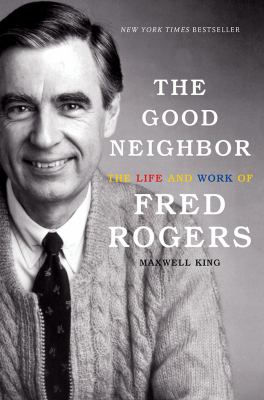Book Club Discussion Questions: The Good Neighbor by Maxwell King
- Elise

- Feb 16, 2021
- 3 min read
Updated: Oct 12, 2021
For those of you that haven't or couldn't attend book club lately, we'll be publishing the previous months' discussion questions here. I hope eventually to post discussion questions for all of the books we've covered since I took over a couple of years ago and beyond, all the way to the beginning over a decade and a half ago. It will take a while. Until then, we will be posting discussion questions on a weekly basis. Here are the questions from a 2019 title, The Good Neighbor. We hope these questions spark discussions of your own.

The Good Neighbor
by Maxwell King
Summary:
New York Times bestseller
2018 Goodreads Choice Award Winner for History & Biography
Fred Rogers (1928–2003) was an enormously influential figure in the history of television and in the lives of tens of millions of children. As the creator and star of Mister Rogers’ Neighborhood, he was a champion of compassion, equality, and kindness. Rogers was fiercely devoted to children and to taking their fears, concerns, and questions about the world seriously.
The Good Neighbor, the first full-length biography of Fred Rogers, tells the story of this utterly unique and enduring American icon. Drawing on original interviews, oral histories, and archival documents, Maxwell King traces Rogers’s personal, professional, and artistic life through decades of work, including a surprising decision to walk away from the show to make television for adults, only to return to the neighborhood with increasingly sophisticated episodes, written in collaboration with experts on childhood development. An engaging story, rich in detail, The Good Neighbor is the definitive portrait of a beloved figure, cherished by multiple generations.
Discussion Questions
A common theme to the book was neighborliness and acts of kindness. How do you see that playing out today or do you see a lack?
Do you think there is a way of getting back to the neighborliness and neighborhood feel that Mr. Rogers sought to provide his young viewers? Why or why not?
Repeatedly mentioned throughout the book are Nancy Roger’s good deeds and giving back to the community, of wealthy serving to prop up those less fortunate and ensure the sustainability of the community. What do you see the role of the more able bodied being in today’s society?
Speaking of Nancy Rogers, this was a time in which women didn’t get MDs, PhDs, or go out into the workforce after marriage. Was this ever a realistic goal? In what ways do you see her passion for medicine having played out within the book?
Throughout Fred Roger’s childhood, King mentions a fair amount of bullying due to his plump stature and wealth. It has been credited for helping to shape Fred into the empathetic individual he was. Do you think this is a fair assessment?
We have seen increasing incidents of cyber bullying and harassment in the news in recent years. What do you think is the solution to such behavior?
With TV in its infancy, Rogers and Carey managed to hone their act with a lot fewer restrictions than there are today. Do you think that a show like Mr. Rogers’ Neighborhood or Children’s Corner would ever be able to be on the air today? How do you think it would look?
What were your thoughts on Fred Rogers using his puppet personas in his day to day communications?
Puppetry is an unusual skillset. Do you have any experience with puppets or do you see it as a lost art?
Fred Rogers was very intent on how everything was presented right down to the wording. Josey Carey once stated that they could spend 20 minutes on “could vs. should vs. would.” What do you place emphasis on in your own life?
Were you at all surprised by Mr. Rogers’ immense musical background?
In November, a group of students made headlines by suing the government to require civics instruction in the classroom as a constitutional right. I heard the argument that it would help to increase respect between opposing viewpoints and increase civility and a willingness to interact with individuals across a wide spectrum. What importance do you see Mr. Rogers placing on such education? Do you agree that it should be a constitutional right? Or that it would improve our society?









Comments